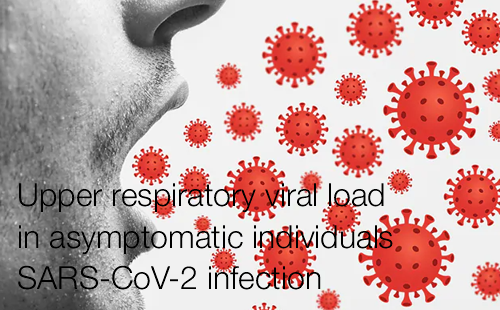Upper respiratory viral load in asymptomatic individuals and mildly symptomatic patients with SARS-CoV-2 infection
ABSTRACT
Background
Asymptomatic individuals with SARSCoV-2 infection have viable viral loads and have been linked to several transmission cases. However, data on the viral loads in such individuals are lacking. We assessed the viral loads in asymptomatic individuals with SARS-CoV-2 infection in comparison with those in symptomatic patients with COVID-19.
Methods
Study participants were recruited from a community facility designated for the isolation of patients with mild COVID-19 in South Korea. The presence of symptoms was evaluated with a questionnaire-based survey. Viral loads in the upper respiratory tract were measured with real-time reverse transcription-PCR (RT-PCR) targeting the E, RdRp and N genes of SARS-CoV-2, with a cycle threshold (Ct) value of 40 for determining positivity.
Results
In 213 patients with SARS-CoV-2 infection, 41 (19%) had remained asymptomatic from potential exposure to laboratory confirmation and admission; of them, 39 (95%) underwent follow-up RT-PCR testing after a median 13 days. In 172 symptomatic patients, 144 (84%) underwent follow-up RT-PCR testing. Twentyone (54%) asymptomatic individuals and 92 (64%) symptomatic patients tested positive for SARS-CoV-2 at follow-up. Asymptomatic individuals and symptomatic patients did not show any significant differences in the mean Ct values of the E (31.15 vs 31.43; p>0.99), RdRp (32.26 vs 32.93; p=0.92) and N (33.05 vs 33.28; p>0.99) genes.
Conclusion
Approximately one-fifth of the individuals without severe symptoms were asymptomatic, and their viral loads were comparable to those in symptomatic patients. A large proportion of mildly symptomatic patients with COVID-19 or asymptomatic individuals with SARS-CoV-2 showed persistent positive upper respiratory RT-PCR results at follow-up.
...
What is the key question?
Do asymptomatic individuals with SARS-CoV-2 infection have the potential to significantly contribute to the community spread of COVID-19?
What is the bottom line?
In a series of 213 patients with COVID-19 without severe symptoms, 19% were asymptomatic from potential exposure to laboratory confirmation and admission. Asymptomatic individuals had comparable loads of SARS-CoV-2 genes to symptomatic patients.
Why read on?
Asymptomatic individuals were frequent among those infected with SARS-CoV-2, but harboured a comparable viral load compared with that of symptomatic patients and may thus act as a meaningful driving force for the community spread of COVID-19.
Add more in attachment
Collegati




















